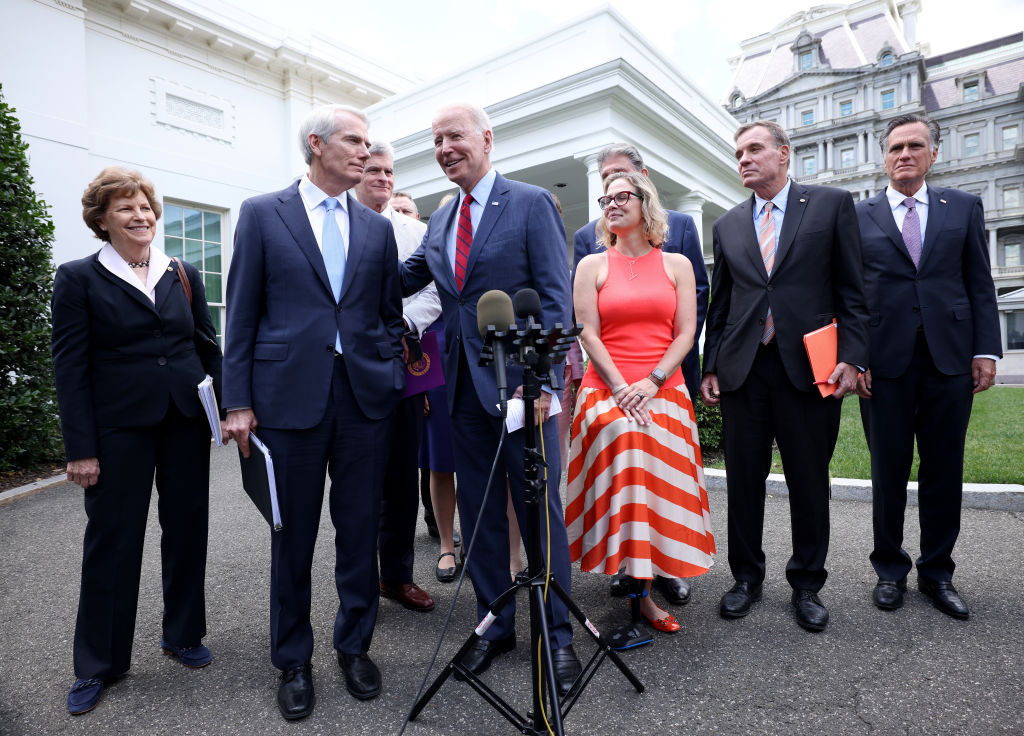Conservative groups opposed to a tax-cheat crackdown ramp up lobbying, threatening infrastructure deal


The White House and congressional Democratic leaders are pushing to translate the nearly $1 trillion bipartisan infrastructure deal into legislative language and get it to the Senate for a vote. The legislation could reach the Senate floor as early as the week of July 19, Politico reports, citing President Biden's legislative affairs team. The White House later clarified "it would be a mistake" to think of that week as "anything more than the opening of a window."
The group of about 20 moderate Senate Democrats and Republicans have split into groups to turn various parts of their deal into legislation, though "lawmakers are still trying to figure out how exactly to make their revenue sources, which include no new taxes, cover nearly $600 billion in new spending," Politico says. The senators have landed on infrastructure privatization, unused coronavirus relief funds and unemployment benefits, and increased tax collection enforcement among their funding sources.
But that last source, spending $40 billion to recover $140 billion in unpaid taxes, has drawn opposition from well-funded conservative political groups, threatening the entire infrastructure deal, The Washington Post reports. The conservative groups are preparing to send Senate GOP leaders a letter warning them not to negotiate with the White House without first pledging "no additional funding for the Internal Revenue Service."
The Week
Escape your echo chamber. Get the facts behind the news, plus analysis from multiple perspectives.

Sign up for The Week's Free Newsletters
From our morning news briefing to a weekly Good News Newsletter, get the best of The Week delivered directly to your inbox.
From our morning news briefing to a weekly Good News Newsletter, get the best of The Week delivered directly to your inbox.
The idea of beefing up the IRS budget after a decade of steep cuts "has broad support among Democrats and Republicans alike, who in recent years have pointed to weaker IRS enforcement and estimates of the nation's persistent 'tax gap,'" the Post reports. But the devil is in the details, and "even these more modest moves may be a tough sell among the GOP" if the legislation "includes not just more funding for the IRS but bolsters a crackdown on tax evasion, even if focused on corporations and the rich."
"Enforcement of tax laws is one thing, but what people are concerned about is aggressive audits," Jason Pye, a federal lobbyist formerly at the conservative group FreedomWorks, tells the Post. Sen. Angus King (I-Maine), one of the bipartisan negotiators, suggested the weakened IRS has already let the rich evade taxes with near-impunity. "Why is it fair to working Americans who pay their taxes to allow people who can afford fancy lawyers and accountants to cheat?" he asked. "I'm not talking about tax avoidance. I'm talking about outright cheating, hiding income."
A free daily email with the biggest news stories of the day – and the best features from TheWeek.com
Peter has worked as a news and culture writer and editor at The Week since the site's launch in 2008. He covers politics, world affairs, religion and cultural currents. His journalism career began as a copy editor at a financial newswire and has included editorial positions at The New York Times Magazine, Facts on File, and Oregon State University.
-
 How the ‘British FBI’ will work
How the ‘British FBI’ will workThe Explainer New National Police Service to focus on fighting terrorism, fraud and organised crime, freeing up local forces to tackle everyday offences
-
 The best family hotels in Europe
The best family hotels in EuropeThe Week Recommends Top kid-friendly hotels with clubs, crèches and fun activities for children of all ages – and some downtime for the grown-ups
-
 Moon dust has earthly elements thanks to a magnetic bridge
Moon dust has earthly elements thanks to a magnetic bridgeUnder the radar The substances could help supply a lunar base
-
 TikTok secures deal to remain in US
TikTok secures deal to remain in USSpeed Read ByteDance will form a US version of the popular video-sharing platform
-
 Unemployment rate ticks up amid fall job losses
Unemployment rate ticks up amid fall job lossesSpeed Read Data released by the Commerce Department indicates ‘one of the weakest American labor markets in years’
-
 US mints final penny after 232-year run
US mints final penny after 232-year runSpeed Read Production of the one-cent coin has ended
-
 Warner Bros. explores sale amid Paramount bids
Warner Bros. explores sale amid Paramount bidsSpeed Read The media giant, home to HBO and DC Studios, has received interest from multiple buying parties
-
 Gold tops $4K per ounce, signaling financial unease
Gold tops $4K per ounce, signaling financial uneaseSpeed Read Investors are worried about President Donald Trump’s trade war
-
 Electronic Arts to go private in record $55B deal
Electronic Arts to go private in record $55B dealspeed read The video game giant is behind ‘The Sims’ and ‘Madden NFL’
-
 New York court tosses Trump's $500M fraud fine
New York court tosses Trump's $500M fraud fineSpeed Read A divided appeals court threw out a hefty penalty against President Trump for fraudulently inflating his wealth
-
 Trump said to seek government stake in Intel
Trump said to seek government stake in IntelSpeed Read The president and Intel CEO Lip-Bu Tan reportedly discussed the proposal at a recent meeting
